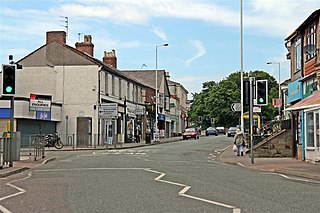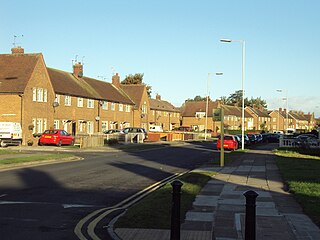Related Research Articles

Merseyside is a metropolitan and ceremonial county in North West England, with a population of 1.38 million. It encompasses the metropolitan area centred on both banks of the lower reaches of the Mersey Estuary and comprises five metropolitan boroughs: Knowsley, St Helens, Sefton, Wirral and the city of Liverpool. Merseyside, which was created on 1 April 1974 as a result of the Local Government Act 1972, takes its name from the River Mersey and sits within the historic counties of Lancashire and Cheshire.

Birkenhead is a town in the Metropolitan Borough of Wirral, Merseyside, England; historically, until 1974, in Cheshire. It is on the Wirral Peninsula, along the south bank of the River Mersey, opposite the city of Liverpool. At the 2011 census, it had a population of 88,818.

Bibby Line is a UK company concerned with shipping and marine operations.

Upton is a village in the northern part of the Wirral Peninsula, England, and is situated within 4 miles (6.4 km) of Birkenhead, 4 miles (6.4 km) of the Dee Estuary, a similar distance from the River Mersey, and 2 miles (3.2 km) from Liverpool Bay. It is in the parish of Overchurch and administratively, the village is a ward of the Metropolitan Borough of Wirral in the metropolitan county of Merseyside. Upton is in the traditional county of Cheshire. At the 2011 census, the population was 16,130.

Irby is a village on the Wirral Peninsula, in Merseyside, England. The village covers an area of 20 square kilometres. To the north of Irby lies the associated hamlet of Irby Hill. It is part of the Greasby, Frankby and Irby Ward of the Metropolitan Borough of Wirral and is within the parliamentary constituency of Wirral West.
The Wirral Railway was a railway network in the northern part of the Wirral Peninsula, England. Its route was from Birkenhead Park in the east of the Wirral to West Kirby in the west. A branch off this line at Bidston went north to Secombe and New Brighton. It was incorporated in 1863 as the Hoylake Railway, running from Hoylake to Birkenhead Docks. After changes of name and of ownership, it was purchased by the Wirral Railway Company Limited in 1884. The network was extended to West Kirby, New Brighton, and Seacombe, and to Birkenhead Park station where it joined the Mersey Railway, enabling through trains through the Mersey Railway Tunnel to Liverpool. In the 1923 grouping the Wirral company became part of the London, Midland and Scottish Railway, which electrified the line in 1938, allowing passenger services to be integrated with the Liverpool urban system. Most of the Wirral Railway network is still in use today as part of the Wirral Line of the Merseyrail commuter rail network.
Wirral, also known as The Wirral, is a peninsula in North West England. The roughly rectangular peninsula is about 15 miles (24 km) long and 7 miles (11 km) wide and is bounded by the River Dee to the west that forms a boundary with Wales, the River Mersey to the east, and the Irish Sea to the north.

Bidston Hill is 100 acres (0.40 km2) of heathland and woodland containing historic buildings and ancient rock carvings, on the Wirral Peninsula, near the Birkenhead suburb of Bidston, in Merseyside, England. With a peak of 231 feet (70 m), Bidston Hill is one of the highest points on the Wirral. The land was part of Sir Robert Vyner's estate and purchased by Birkenhead Corporation in 1894 for use by the public.

Greasby is a large village on the Wirral Peninsula, Merseyside, England. A predominantly residential area, it is contiguous with Upton to the east and Saughall Massie to the north. The small village of Frankby is to the immediate west. Historically within the county of Cheshire, it is part of the Greasby, Frankby and Irby Ward of the Metropolitan Borough of Wirral and is in the parliamentary constituency of Wirral West.

Woodchurch is an area of Birkenhead on the Wirral Peninsula, in England. Administratively, Woodchurch is within the Metropolitan Borough of Wirral, its parliamentary constituency is Wirral West, and its local council ward is Upton. At the 2001 Census, it had a population of 8,400. Woodchurch is dominated by a large housing development, known as the Woodchurch Estate. The district is served by several schools and has the major Arrowe Park Hospital just outside its boundary, which was built on 15 acres (61,000 m2) of the park itself and opened in 1982.

Saughall Massie is a village on the Wirral Peninsula, Merseyside, England. It is part of the Moreton West & Saughall Massie Ward of the Metropolitan Borough of Wirral and the parliamentary constituency of Wallasey. A small village primarily made up of large fields owned by local farmers, it is bordered by Greasby, Meols, Moreton and Upton. At the 2001 census Saughall Massie had a population of 1,260.

Arrowe Park is an area 6.5 km (4.0 mi) to the west of Birkenhead, within the Metropolitan Borough of Wirral, Merseyside, England. It is situated on the Wirral Peninsula, adjacent to the Woodchurch housing estate and to the south of the large village of Upton. The location has two landmarks: Arrowe Park Hospital and Arrowe Country Park, along with a number of residences.

Alfred Booth and Company was a British trading and shipping company that was founded in 1866 and traded for more than a century. It was founded in Liverpool, England, by two brothers, Alfred and Charles Booth. It grew into a significant merchant shipping company with its head office in Liverpool and interests in the United States and South America. The group was broken up in 1964 and the last Booth company from the group was sold in 1986.

Sir Edward James Harland, 1st Baronet, was an Ulster-based English shipbuilder and politician. Born in Scarborough in the North Riding of Yorkshire, he was educated at Edinburgh Academy. In 1846, aged 15, he took an apprenticeship at the engineering works of Robert Stephenson and Company in Newcastle upon Tyne. Afterwards he was employed in jobs in Glasgow and again in Newcastle, before moving to Belfast in 1854 to manage Robert Hickson's shipyard at Queen's Island. Four years later he bought the yard and renamed the business Edward James Harland and Company. In 1861 he formed a business partnership with Gustav Wilhelm Wolff, his former personal assistant, creating Harland and Wolff. Later, Harland recruited William James Pirrie as another partner. Edward Harland, Gustav Wolff and William James Pirrie maintained a successful business, receiving regular orders from the White Star Line, before Harland's retirement in 1889, leaving Wolff and Pirrie to manage the shipyard.
Gustav Christian Schwabe was a German-born merchant and financier who funded companies such as John Bibby & Sons, Harland and Wolff and the White Star Line. Born in Hamburg, Germany, Schwabe moved to Liverpool in 1838 and spent his working life there. Later, Schwabe would spend more time at his house in London, and retired in 1893.

Avon Buses was a bus operator based in Prenton providing services in Merseyside and Cheshire, England.
Leonard Fairclough & Son Ltd was a construction firm based in Adlington, Lancashire, England. It is most famous for accepting the contract to destroy the Euston Arch.
Wirral University Teaching Hospital NHS Foundation Trust (WUTH) is an NHS Foundation Trust. It provides healthcare for people of the Wirral Peninsula and the surrounding areas of North West England and North Wales.

The Leyland Line was a British shipping transport line founded in 1873 by Frederick Richards Leyland after his apprenticeship in the firm of John Bibby, Sons & Co. After Frederick Leyland's death, the company was taken over by Sir John Ellerman in 1892. The Company was liquidated in 1935.
Bibby Financial Services (BFS) is a multinational corporation that provides financial services to small and medium-sized enterprises (SMEs).
References
- 1 2 Magazine, Wirral Life (2017-06-12). "An interview with Peter Bibby". Wirral Life Magazine. Retrieved 2022-07-17.
- 1 2 Bhalla, Ajay; Lampel, Joseph; Banerjee, Aneesh (2015). "Regenerating a family business bibby line group through diversification and ownership governance" (PDF). Institute For Family Business. Retrieved July 17, 2022 .
{{cite web}}: Check date values in:|access-date=and|date=(help)CS1 maint: url-status (link) - ↑ "Our Story". Bibby Line Group. Retrieved 2022-07-17.
- 1 2 "Tycoon who had cancer killed himself with poison in sauna". The Independent. 2002-11-29. Retrieved 2022-07-17.
- ↑ "Sick magnate turned sauna into suicide gas chamber". the Guardian. 2002-11-29. Retrieved 2022-07-17.
- ↑ "Bibby's death caused hospital alert". 2002-11-28. Retrieved 2022-07-17.
- ↑ Echo, Liverpool (2002-10-10). "Hospital drama after death of Bibby boss". Liverpool Echo. Retrieved 2022-07-17.
- ↑ Ltd, Not Panicking. "h2g2 - Sir Derek Bibby - Businessman, Philanthropist, Gardener - Edited Entry". h2g2.com. Retrieved 2022-07-17.